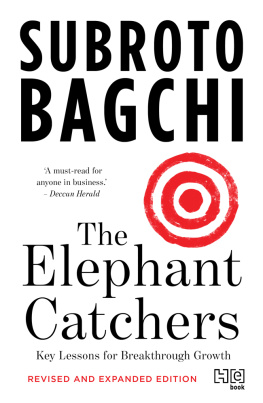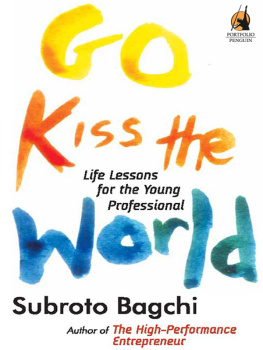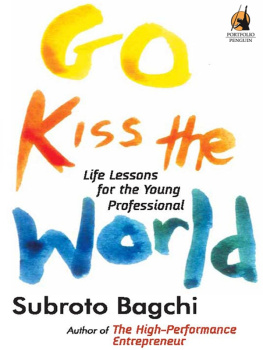
SUBROTO
BAGCHI
THE ELEPHANT CATCHERS
KEY LESSONS FOR BREAKTHROUGH GROWTH

First published in 2013 by Hachette India
(Registered name: Hachette Book Publishing India Pvt. Ltd)
An Hachette UK company
www.hachetteindia.com
This revised and expanded edition published in paperback in 2017

This ebook published in 2017
(Text) Copyright 2013, 2017 Subroto Bagchi
Subroto Bagchi asserts the moral right to be identified as the author of this work.
All rights reserved. No part of the publication may be copied, reproduced, downloaded, stored in a retrieval system, or transmitted in any form or by any means without the prior written permission of the publisher, nor be otherwise circulated in any form of binding or cover or digital format other than that in which it is published and without a similar condition being imposed on the subsequent purchaser.
Hardback edition ISBN 978-93-5009-583-6
Paperback edition ISBN 978-93-5195-000-4
Ebook edition ISBN 978-93-5009-672-7
Cover design by Mecob Design Ltd
Hachette Book Publishing India Pvt. Ltd
4th/5th Floors, Corporate Centre
Plot No. 94, Sectr 44, Gurgaon 122003, India
Originally typeset in Guardi LT Std 10/16.8
by InoSoft Systems, Noida
For Thomas Abraham, the elephant catcher
CONTENTS
IN 2006, MY BOOK The High-Performance Entrepreneur broke new ground as a must-read for would-be entrepreneurs. It became immensely popular among an entire generation of young Indians who dreamt beyond getting a job, about building businesses and creating jobs for others. The book was based on my experiences of failure at starting a company when I was 28 and then successfully co-founding Mindtree when I was 42. Through these two experiences and my observations of many great entrepreneurs, the book stated my belief that start-ups must be designed for high performance and that this is not impossible to achieve.
In the intervening years, a lot has changed in my life as a professional and an entrepreneur. In 2007, Mindtree got its public listing. Listing a company at the stock exchange is the ultimate dream of every start-up. But taking a company to that stage brings with it the obligation of growth. Quite naturally, after 2007, all our endeavours and transformative experiences have had a lot to do with the challenge of scaling.
In some ways, starting something is easier than scaling it. That is why people and their businesses hit the proverbial glass ceiling despite a successful start. The Elephant Catchers synthesizes my learning of the last few years and contains a collection of hard-earned lessons on a spectrum of issues around the core idea of scaling an organization and its people.
The book is arranged in six sections. In tells you about the final frontier, where the leader must scale his own self. We all know that behind every organization there is the leader who sets it on its path. A time comes when the leader himself is required to pass tests that come in his way in the form of certain rites of passage and bolts from the blue. The response of the leader, sometimes deeply personal, defines the destiny of the organization.
The core idea of scale and its associated attributes and challenges are not unique to for-profit businesses. These are equally applicable to any institution and, I can even say, every individual. I hope that in this book you will be able to get some insight about your own organization and yourself. For that, I ask you to bear with me when you see terms like leader, founder, entrepreneur, manager or management. I have used these words interchangeably. Similarly, when you come across the words start-up, company, institution or organization, please interpret it as a placeholder for a larger idea. All of them will fit into two classifications: those that scale and those that dont. The broad considerations why some do and some dont stay the same irrespective of the kind of organization they are.
The original manuscript had a she for every he, because that is how it largely is in the modern workplace. But my editor, Poulomi Chatterjee, struck this down in the interest of easy readability. So, wherever you see a he, please do not conjure a male image. Instead, think of my editor.
The Elephant Catchers does not pretend to be the complete book on the subject of scale. I am not a management guru; I am a mere practitioner. To that extent my lessons could be imperfect, but they are real. All the experiences I have written about in this book have been lived by me. I would also like to remind my readers that Mindtree is my platform, my high-sea rig, my runway. I take off from it and land on it. References to Mindtree in this book are meant to bring to you real experiences and, through these, to share real lessons. It is not to suggest that Mindtree is the shining example of scale. I always tell my colleagues that we walk in the shadows of giants, and I truly believe that.
Lastly, the purpose of this book is not to glorify scale. It is to tell you how to scale if you want to, need to, and if you must. Some things in life are meant to stay small and life has a way of ensuring everything has its place. I hope you find the book useful as you set out on your own journey to take your life and your enterprise someplace.
THE IDEA
OF
SCALE
 Those who do not embrace the notion of size and cannot enjoy magnitude will always have problems with it.
Those who do not embrace the notion of size and cannot enjoy magnitude will always have problems with it. 
SOME YEARS AGO I was invited to give a talk at the Siddaganga Institute of Technology in Tumkur, near Bengaluru. It was set up in 1963 by a religious trust called Sree Siddaganga Mutt, which has been in existence since the fifteenth century CE. The current head of the institution, known reverentially as Swamiji, assumed charge of the institution sometime in the 1930s. Today, the trust runs many schools, and engineering and management colleges, that thousands of students attend from all around the country.
After my talk, I was driven to the village where Swamiji, who is now 106 years old, lives. Within the village, surrounded by temples, residences and a few shops, is a large, open space, a giant courtyard. When I arrived there dusk was setting in and it was time for the evening prayers. As our car pulled up at the entrance to the village, I witnessed one of the most spectacular sights I have ever experienced. The courtyard was filling up really fast with boys of all ages pouring in from every direction. Some were running around and some were huddled in groups, but there was great energy and joy on every face. The entire place hummed with their excitement. To my astonishment, I was told that 8,500 boys had gathered there!
The chattering of the children in front of me was like the sound you would hear under the canopy of a large tree when thousands of birds come home, circle their nests, and make joyful noises before settling down. Then, just like the birds suddenly become quiet and become one with the canopy above, the children too stopped scampering around and squatted in the courtyard in neat rows. It was time for them to sing their hymns. The voices, thousands in unison, sang the evening prayers as Swamiji sat in deep meditation beyond the sea of lowered heads.
After singing the hymns, the boys rose and ran towards their hostels with the same childlike abandon with which they had arrived. It was time for them to collect their plates and go to the dining hall where a wholesome but simple meal awaited them. I sat down among them to eat their fare. My host, the principal of the engineering college set up by the Mutt, was seated next to me. He told me that he was a product of this very institution. At one time he too had been like the children we were sitting with. These boys, all from neighbouring villages, had been left in the care of the Mutt by their parents.
Next page













 Those who do not embrace the notion of size and cannot enjoy magnitude will always have problems with it.
Those who do not embrace the notion of size and cannot enjoy magnitude will always have problems with it. 